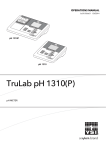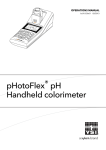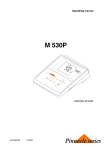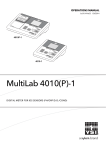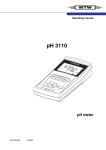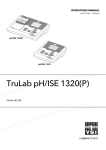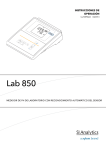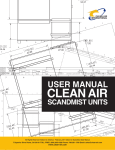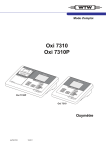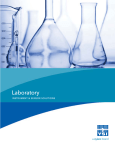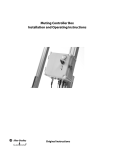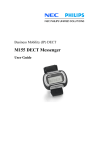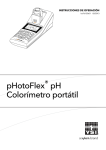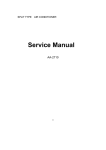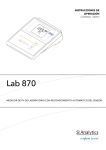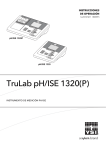Download YSI TruLab 1110 User Manual
Transcript
OPERATIONS MANUAL ba76155e01 pH 111 0 TruLab pH 1110 pH METER 03/2014 TruLab pH 1110 For the most recent version of the manual, please visit www.ysi.com. Contact Copyright 2 YSI 1725 Brannum Lane Yellow Springs, OH 45387 USA Tel: +1 937-767-7241 800-765-4974 Email: [email protected] Internet: www.ysi.com © 2014 Xylem Inc. ba76155e01 03/2014 TruLab pH 1110 Contents TruLab pH 1110 - Contents 1 Overview . . . . . . . . . . . . . . . . . . . . . . . . . . . . . . . . . 7 1.1 TruLab pH 1110 meter . . . . . . . . . . . . . . . . . . . . . . . . . . . . . . . . . . . 7 1.2 Sensors . . . . . . . . . . . . . . . . . . . . . . . . . . . . . . . . . . . . . . . . . . . . . . . 7 2 Safety. . . . . . . . . . . . . . . . . . . . . . . . . . . . . . . . . . . . 8 2.1 Safety information . . . . . . . . . . . . . . . . . . . . . . . . . . . . . . . . . . . . . . . 2.1.1 Safety information in the operating manual. . . . . . . . . . . . . . . . 2.1.2 Safety signs on the meter . . . . . . . . . . . . . . . . . . . . . . . . . . . . . 2.1.3 Further documents providing safety information . . . . . . . . . . . . 8 8 8 8 2.2 Safe operation . . . . . . . . . . . . . . . . . . . . . . . . . . . . . . . . . . . . . . . . . . 2.2.1 Authorized use . . . . . . . . . . . . . . . . . . . . . . . . . . . . . . . . . . . . . 2.2.2 Requirements for safe operation. . . . . . . . . . . . . . . . . . . . . . . . 2.2.3 Unauthorized use . . . . . . . . . . . . . . . . . . . . . . . . . . . . . . . . . . . 9 9 9 9 3 Commissioning. . . . . . . . . . . . . . . . . . . . . . . . . . . 10 3.1 Scope of delivery . . . . . . . . . . . . . . . . . . . . . . . . . . . . . . . . . . . . . . . 10 3.2 Power supply . . . . . . . . . . . . . . . . . . . . . . . . . . . . . . . . . . . . . . . . . . 10 3.3 Initial commissioning . . . . . . . . . . . . . . . . . . . . . . . . . . . . . . . . . . . . 3.3.1 Inserting the batteries . . . . . . . . . . . . . . . . . . . . . . . . . . . . . . . 3.3.2 Connecting the power pack. . . . . . . . . . . . . . . . . . . . . . . . . . . 3.3.3 Mounting the stand . . . . . . . . . . . . . . . . . . . . . . . . . . . . . . . . . 4 10 10 11 12 Operation. . . . . . . . . . . . . . . . . . . . . . . . . . . . . . . . 13 4.1 General operating principles . . . . . . . . . . . . . . . . . . . . . . . . . . . . . . 13 4.1.1 Keypad . . . . . . . . . . . . . . . . . . . . . . . . . . . . . . . . . . . . . . . . . . 13 4.1.2 Display . . . . . . . . . . . . . . . . . . . . . . . . . . . . . . . . . . . . . . . . . . 14 ba76155e01 03/2014 3 Contents TruLab pH 1110 4.1.3 4.1.4 Status information . . . . . . . . . . . . . . . . . . . . . . . . . . . . . . . . . 14 Socket field . . . . . . . . . . . . . . . . . . . . . . . . . . . . . . . . . . . . . . 15 4.2 Switching on the meter. . . . . . . . . . . . . . . . . . . . . . . . . . . . . . . . . . 15 4.3 Switching off the meter. . . . . . . . . . . . . . . . . . . . . . . . . . . . . . . . . . 15 4.4 Navigation . . . . . . . . . . . . . . . . . . . . . . . . . . . . . . . . . . . . . . . . . . . 4.4.1 Operating modes . . . . . . . . . . . . . . . . . . . . . . . . . . . . . . . . . . 4.4.2 Measuring mode (measured value display) . . . . . . . . . . . . . . 4.4.3 Setting mode . . . . . . . . . . . . . . . . . . . . . . . . . . . . . . . . . . . . . 5 16 16 16 16 pH value . . . . . . . . . . . . . . . . . . . . . . . . . . . . . . . . . 18 5.1 Measuring. . . . . . . . . . . . . . . . . . . . . . . . . . . . . . . . . . . . . . . . . . . . 18 5.1.1 Measuring the pH value . . . . . . . . . . . . . . . . . . . . . . . . . . . . . 18 5.1.2 Measuring the temperature . . . . . . . . . . . . . . . . . . . . . . . . . . 19 5.2 Calibration . . . . . . . . . . . . . . . . . . . . . . . . . . . . . . . . . . . . . . . . . . . 5.2.1 Why calibrate? . . . . . . . . . . . . . . . . . . . . . . . . . . . . . . . . . . . . 5.2.2 When to calibrate? . . . . . . . . . . . . . . . . . . . . . . . . . . . . . . . . . 5.2.3 Automatic calibration (AutoCal) . . . . . . . . . . . . . . . . . . . . . . . 5.2.4 Manual calibration (ConCal) . . . . . . . . . . . . . . . . . . . . . . . . . 5.2.5 Calibration points . . . . . . . . . . . . . . . . . . . . . . . . . . . . . . . . . . 5.2.6 Calibration data . . . . . . . . . . . . . . . . . . . . . . . . . . . . . . . . . . . 6 19 19 20 20 22 24 24 ORP . . . . . . . . . . . . . . . . . . . . . . . . . . . . . . . . . . . . 27 6.1 Measuring. . . . . . . . . . . . . . . . . . . . . . . . . . . . . . . . . . . . . . . . . . . . 27 6.1.1 Measuring the ORP . . . . . . . . . . . . . . . . . . . . . . . . . . . . . . . . 27 6.1.2 Measuring the temperature . . . . . . . . . . . . . . . . . . . . . . . . . . 28 6.2 Calibration . . . . . . . . . . . . . . . . . . . . . . . . . . . . . . . . . . . . . . . . . . . 28 7 Settings . . . . . . . . . . . . . . . . . . . . . . . . . . . . . . . . . 29 7.1 Measurement settings (pH) . . . . . . . . . . . . . . . . . . . . . . . . . . . . . . 7.1.1 Changing the settings for pH measurements. . . . . . . . . . . . . 7.1.2 Buffer sets for calibration . . . . . . . . . . . . . . . . . . . . . . . . . . . . 7.1.3 Calibration interval . . . . . . . . . . . . . . . . . . . . . . . . . . . . . . . . . 29 29 30 31 7.2 Measurement settings (ORP). . . . . . . . . . . . . . . . . . . . . . . . . . . . . 31 7.2.1 Changing the settings for ORP measurements . . . . . . . . . . . 31 4 ba76155e01 03/2014 TruLab pH 1110 Contents 7.3 Sensor-independent settings . . . . . . . . . . . . . . . . . . . . . . . . . . . . . 32 7.3.1 Changing the sensor-independent settings . . . . . . . . . . . . . . 32 7.3.2 Energy saving (battery operation) . . . . . . . . . . . . . . . . . . . . . 32 8 Reset . . . . . . . . . . . . . . . . . . . . . . . . . . . . . . . . . . . 34 8.1 Resetting the calibration values . . . . . . . . . . . . . . . . . . . . . . . . . . . 34 8.2 Resetting the measurement and system settings . . . . . . . . . . . . . 34 9 Maintenance, cleaning, disposal . . . . . . . . . . . . . 36 9.1 Maintenance. . . . . . . . . . . . . . . . . . . . . . . . . . . . . . . . . . . . . . . . . . 36 9.1.1 General maintenance activities . . . . . . . . . . . . . . . . . . . . . . . 36 9.1.2 Replacing the batteries . . . . . . . . . . . . . . . . . . . . . . . . . . . . . 36 9.2 Cleaning . . . . . . . . . . . . . . . . . . . . . . . . . . . . . . . . . . . . . . . . . . . . . 37 9.3 Packing. . . . . . . . . . . . . . . . . . . . . . . . . . . . . . . . . . . . . . . . . . . . . . 37 9.4 Disposal . . . . . . . . . . . . . . . . . . . . . . . . . . . . . . . . . . . . . . . . . . . . . 37 10 What to do if... . . . . . . . . . . . . . . . . . . . . . . . . . . . . 38 10.1 pH. . . . . . . . . . . . . . . . . . . . . . . . . . . . . . . . . . . . . . . . . . . . . . . . . . 10.1.1 No stable measured value . . . . . . . . . . . . . . . . . . . . . . . . . . . 10.1.2 Error message CalError . . . . . . . . . . . . . . . . . . . . . . . . . . . . . 10.1.3 Error message OFL, UFL. . . . . . . . . . . . . . . . . . . . . . . . . . . . 38 38 38 39 10.2 ORP . . . . . . . . . . . . . . . . . . . . . . . . . . . . . . . . . . . . . . . . . . . . . . . . 39 10.2.1 No stable measured value . . . . . . . . . . . . . . . . . . . . . . . . . . . 39 10.2.2 Error message OFL, UFL. . . . . . . . . . . . . . . . . . . . . . . . . . . . 40 10.3 General information . . . . . . . . . . . . . . . . . . . . . . . . . . . . . . . . . . . . 10.3.1 Symbol for calibration evaluation flashes. . . . . . . . . . . . . . . . 10.3.2 [LoBat] display . . . . . . . . . . . . . . . . . . . . . . . . . . . . . . . . . . . . 10.3.3 Instrument does not react to keystroke . . . . . . . . . . . . . . . . . 10.3.4 Displaying the software version (meter). . . . . . . . . . . . . . . . . 11 40 40 40 41 41 Technical data . . . . . . . . . . . . . . . . . . . . . . . . . . . . 42 11.1 Measuring ranges, resolution, accuracy. . . . . . . . . . . . . . . . . . . . . 42 11.1.1 Measuring ranges, resolution. . . . . . . . . . . . . . . . . . . . . . . . . 42 11.1.2 Manual temperature input . . . . . . . . . . . . . . . . . . . . . . . . . . . 42 ba76155e01 03/2014 5 Contents TruLab pH 1110 11.1.3 Accuracy (± 1 digit) . . . . . . . . . . . . . . . . . . . . . . . . . . . . . . . . 43 11.2 General data. . . . . . . . . . . . . . . . . . . . . . . . . . . . . . . . . . . . . . . . . . 43 12 Glossary. . . . . . . . . . . . . . . . . . . . . . . . . . . . . . . . . 46 12.1 pH/ORP . . . . . . . . . . . . . . . . . . . . . . . . . . . . . . . . . . . . . . . . . . . . . 46 12.2 General information . . . . . . . . . . . . . . . . . . . . . . . . . . . . . . . . . . . . 47 13 Index. . . . . . . . . . . . . . . . . . . . . . . . . . . . . . . . . . . . 49 14 Contact Information . . . . . . . . . . . . . . . . . . . . . . . 51 14.1 Ordering & Technical Support . . . . . . . . . . . . . . . . . . . . . . . . . . . . 51 14.2 Service Information . . . . . . . . . . . . . . . . . . . . . . . . . . . . . . . . . . . . 51 6 ba76155e01 03/2014 TruLab pH 1110 1 Overview Overview 1.1 TruLab pH 1110 meter The TruLab pH 1110 compact digital precision meter enables you to perform pH and ORP measurements quickly and reliably. The TruLab pH 1110 provides the maximum degree of operating comfort, reliability and measuring certainty for all applications. 3 2 1 pH 111 0 1 Keypad 2 Display 3 Socket field 1.2 Sensors A measuring system ready to measure consists of the TruLab pH 1110 meter and a suitable sensor. The TruLab pH 1110 can be operated with the following sensors: • pH electrode • ORP electrode Information on available sensors is given on the Internet and in the WTW catalog, "Laboratory and field instrumentation". ba76155e01 03/2014 7 Safety 2 TruLab pH 1110 Safety 2.1 Safety information 2.1.1 Safety information in the operating manual This operating manual provides important information on the safe operation of the meter. Read this operating manual thoroughly and make yourself familiar with the meter before putting it into operation or working with it. The operating manual must be kept in the vicinity of the meter so you can always find the information you need. Important safety instructions are highlighted in this operating manual. They are indicated by the warning symbol (triangle) in the left column. The signal word (e.g. "CAUTION") indicates the level of danger: WARNING indicates a possibly dangerous situation that can lead to serious (irreversible) injury or death if the safety instruction is not followed. CAUTION indicates a possibly dangerous situation that can lead to slight (reversible) injury if the safety instruction is not followed. NOTE indicates a possibly dangerous situation where goods might be damaged if the actions mentioned are not taken. 2.1.2 Safety signs on the meter Note all labels, information signs and safety symbols on the meter and in the battery compartment. A warning symbol (triangle) without text refers to safety information in this operating manual. 2.1.3 Further documents providing safety information The following documents provide additional information, which you should observe for your safety when working with the measuring system: • Operating manuals of sensors and other accessories • Safety datasheets of calibration or maintenance accessories (such as buffer solutions, electrolyte solutions, etc.) 8 ba76155e01 03/2014 TruLab pH 1110 Safety 2.2 Safe operation 2.2.1 Authorized use This meter is authorized exclusively for pH and ORP measurements in the laboratory. Only the operation and running of the meter according to the instructions and technical specifications given in this operating manual is authorized (see section 11 TECHNICAL DATA, page 42). Any other use is considered unauthorized. 2.2.2 Requirements for safe operation Note the following points for safe operation: • The meter may only be operated according to the authorized use specified above. • The meter may only be supplied with power by the energy sources mentioned in this operating manual. • The meter may only be operated under the environmental conditions mentioned in this operating manual. • The meter may only be opened if this is explicitly described in this operating manual (example: Inserting the batteries). 2.2.3 Unauthorized use The meter must not be put into operation if: • it is visibly damaged (e.g. after being transported) • it was stored under adverse conditions for a lengthy period of time (storing conditions, see section 11 TECHNICAL DATA, page 42). ba76155e01 03/2014 9 Commissioning 3 TruLab pH 1110 Commissioning 3.1 • • • • • • • • Scope of delivery TruLab pH 1110 meter 4 batteries 1.5 V Mignon type AA Power pack Stand Stand holder Short instructions Detailed operating manual (4 languages) CD-ROM with detailed operating manual 3.2 Power supply The TruLab pH 1110 is supplied with power in the following ways: • Mains operation with the supplied power pack. • Battery operation (4 x alkaline manganese batteries, type AA) 3.3 Initial commissioning Perform the following activities: • • • • Insert the supplied batteries Connect the power pack (mains operation) Mount the stand Switch on the meter (see section 4.2 SWITCHING ON THE METER, page 15) 3.3.1 Inserting the batteries You can operate the meter either with normal batteries or with rechargeable batteries (Ni-MH). In order to charge the batteries, an external charging device is required. 10 ba76155e01 03/2014 TruLab pH 1110 Commissioning 1. Open the battery compartment (2) on the underside of the meter. 2. 2 Insert four batteries in the battery compartment. CAUTION Make sure that the poles of the batteries are positioned correctly. The ± signs on the batteries must correspond to the ± signs in the battery compartment. 3. Close the battery compartment tightly. When the batteries are nearly empty, the [LoBat] status indicator is displayed. 3.3.2 Connecting the power pack CAUTION The line voltage at the operating site must lie within the input voltage range of the original power pack (see section 11 TECHNICAL DATA, page 42). CAUTION Use original power packs only (see section 11 TECHNICAL DATA, page 42). ba76155e01 03/2014 1. Connect the plug of the power pack to the socket for the power pack on the TruLab pH 1110. 2. Connect the original power pack to an easily accessible power outlet. 11 Commissioning TruLab pH 1110 3.3.3 Mounting the stand The stand base can be mounted at the right side of the meter. 2 1 12 ba76155e01 03/2014 TruLab pH 1110 4 Operation Operation 4.1 General operating principles This section contains basic information on the operation of the TruLab pH 1110. 4.1.1 Keypad In this operating manual, keys are indicated by brackets <..> . The key symbol (e.g. <ENTER>) generally indicates a short keystroke (under 2 sec) in this operating manual. A long keystroke (approx. 2 sec) is indicated by the underscore behind the key symbol (e.g. <ENTER__>). Key ba76155e01 03/2014 Symbol Meaning <On/Off> <On/Off__> Switches the meter on or off Resets calibration data <M> <M__> Selects the measured parameter Opens the measurement settings <CAL> <CAL__> Calls up the calibration procedure Displays the calibration data <><> <__><__> Increments, decrements values Increments, decrements values continuously <ENTER> <ENTER__> Confirms entries Opens the menu for system settings 13 Operation TruLab pH 1110 4.1.2 Display 3 UpH 2 1 8 8 8 8°F mV/pH % 8 8 8 8 °C Time 1 4 LoBat AutoCal DIN 5 TP CalError AutoCal TEC ConCal AR 1 Status information 2 Measured value (with unit) 3 Measured parameter 4 Sensor symbol (calibration evaluation, calibration interval) 5 Measured temperature (with unit) 4.1.3 14 Status information Display Meaning [AutoCal TEC] [AutoCal DIN] Calibration with automatic buffer recognition, e.g. with the buffer set: Technical buffers [ConCal] Calibration with any buffers [CalError] An error occurred during calibration [AR] Stability control (AutoRead) is active [TP] Temperature measurement active [Time] Setting of calibration interval [LoBat] Batteries are almost empty ba76155e01 03/2014 TruLab pH 1110 Operation 4.1.4 Socket field 1 2 3 4 5 1 pH electrode 2 Reference electrode 3 Temperature sensor 4 Power pack 5 Service interface 4.2 Switching on the meter 1. Switch on the meter with <On/Off>. The meter performs a self-test. The meter switches to the measuring mode (measured value display). 2. Connect the sensor. The meter is ready to measure. pH 6992 248 TP °C AR 4.3 1. ba76155e01 03/2014 Switching off the meter Switch off the meter with <On/Off>. The meter is switched off. 15 Operation TruLab pH 1110 When the meter is powered by the batteries, it switches itself off automatically after an adjustable interval to save the batteries (see section Automatic switch-off function, page 32). 4.4 Navigation 4.4.1 Operating modes The meter has the following operating modes: Operating mode Description Measuring The measurement data of the connected sensor are shown in the measured value display Calibration The course of a calibration with calibration information, functions and settings is displayed Transmitting data The meter transmits measuring data and calibration records to a USB-B interface automatically or manually. Setting A setting is displayed. 4.4.2 Measuring mode (measured value display) The following functions are available in the measuring mode (measured value display): • Change the display in the selected measuring window (e. g. pH <-> mV) by pressing <M> • To open the measurement settings, press <M__> (long pressure). • To open the system settings, press <ENTER__> (long pressure). 4.4.3 Setting mode The following functions are available in the setting mode: • To change the current setting, press <><>. • Confirm the setting with <ENTER>. The next setting is displayed. The settings are stored. 16 ba76155e01 03/2014 TruLab pH 1110 Operation When the last setting is confirmed, the setting menu is automatically quit. • Press <M> to exit the setting mode. ba76155e01 03/2014 17 pH value 5 TruLab pH 1110 pH value 5.1 Measuring 5.1.1 Measuring the pH value To ensure the high measurement accuracy of the measuring system, always measure with A current calibration (see section 5.2 CALIBRATION, page 19). 1. Connect the pH electrode to the meter. 2. When measuring without temperature sensor: Temper the test sample or measure the current temperature. 3. If necessary, select the measured parameter (pH) with <M>. 4. Immerse the pH electrode in the test sample. The measured value is checked for stability (stability control). The [AR] status display flashes. pH 6992 248 TP °C AR 5. When measuring without temperature sensor: Enter the temperature of the buffer with <><>. 6. Wait for a stable measured value. The [AR] display indicator no longer flashes. Stability control (AutoRead ) During the measuring procedure, the stability control function is automatically activated. The stability control function (AutoRead) continually checks the stability of the measured values in the monitored time interval. The stability has a considerable impact on the reproducibility of measured values. The [AR] display indicator flashes until a stable value is measured. 18 ba76155e01 03/2014 TruLab pH 1110 pH value Stability criteria (AutoRead ) Measured parameter Time interval Stability in the time interval pH value 15 seconds ∆ : Better than 0.01 pH Temperature 15 seconds ∆ : Better than 0.5 °C The minimum duration until a measured value is assessed as stable is the monitored time interval. The actual duration is mostly longer. 5.1.2 Measuring the temperature For reproducible pH measurements, it is essential to measure the temperature of the test sample. You have the following options to measure the temperature: • Automatic measurement of the temperature with the temperature sensor (NTC30 or Pt1000) integrated in the sensor. • Measurement with an external temperature sensor. • Manual determination and input of the temperature. The measuring instrument recognizes whether a suitable sensor is connected and automatically switches on the temperature measurement. Which type of temperature measurement is active is indicated by the temperature display and the [TP] status indicator: Temperature sensor Resolution of the temp. display Status indicator yes 0.1 °C [TP] Automatic with temperature sensor - 1 °C - Manual Temp. measurement If you wish to measure (or calibrate) without temperature sensor, proceed as follows: 1. Measure the current temperature of the test sample. 2. Set the temperature value with <><>. 5.2 Calibration 5.2.1 Why calibrate? When a pH electrode is operated, its zero point (asymmetry) and slope change with the course of time. As a result, an inexact measured value is displayed. ba76155e01 03/2014 19 pH value TruLab pH 1110 Calibration determines and stores the current values of the zero point and slope. Thus, you should calibrate at regular intervals. 5.2.2 When to calibrate? • When the calibration interval has expired • Routinely within the framework of the company quality assurance • After connecting another combination electrode 5.2.3 Automatic calibration (AutoCal) Use any one to three buffer solutions of the selected buffer set in ascending or descending order. Below, calibration with YSI buffers (TEC) is described. When other buffer sets are used, other nominal buffer values are displayed. Apart from that, the procedure is identical. 1. Start the calibration with <CAL>. The calibration display for the first buffer appears. 2. When measuring without temperature sensor: Temper the buffer or measure the current temperature. 3. If necessary, press <CAL> to select the buffer set used ([AutoCal TEC], [AutoCal DIN]). Ct1 or Cd1 is displayed. pH CT1 2 4 8 °C TP AutoCal TEC 20 4. Thoroughly rinse the pH electrode with deionized water. 5. Immerse the pH electrode in the first buffer solution. 6. When measuring without temperature sensor: Enter the temperature of the buffer with <><>. 7. Start the measurement with <ENTER> . The measured value is checked for stability (stability control). The [AR] status display flashes. The electrode voltage (mV) or the nominal value of the buffer is displayed (setting: see section 7.1.1 CHANGING THE SETTINGS FOR PH MEASUREMENTS, page 29). ba76155e01 03/2014 TruLab pH 1110 pH value 8. Wait for the measurement with stability control to be completed or terminate the stability control with <ENTER>. The calibration display for the next buffer appears. Ct2 or Cd2 is displayed. pH CT2 2 4 8 °C TP AutoCal TEC 9. If necessary, finish the calibration procedure as a single-point calibration with <M>. The calibration record is displayed. For single-point calibration, the instrument uses the Nernst slope (-59.2 mV/pH at 25 °C) and determines the zero point of the pH electrode. or Continue calibration using the next buffer with <ENTER>. Continuing with two-point calibration ba76155e01 03/2014 10. Thoroughly rinse the pH electrode with deionized water. 11. Immerse the pH electrode in the second buffer solution. 12. When measuring without temperature sensor: Enter the temperature of the buffer with <><>. 13. Start the measurement with <ENTER> . The measured value is checked for stability (stability control). The [AR] status display flashes. The electrode voltage (mV) or the nominal value of the buffer is displayed (setting: see section 7.1.1 CHANGING THE SETTINGS FOR PH MEASUREMENTS, page 29). 14. Wait for the measurement with stability control to be completed or terminate the stability control and take over the calibration value with <ENTER>. The calibration display for the next buffer appears. Ct3 or Cd3 is displayed. 21 pH value TruLab pH 1110 pH CT3 2 4 8 °C TP AutoCal TEC 15. If necessary, finish the calibration procedure as a two-point calibration with <M>. The calibration record is displayed. or Continue calibration using the next buffer with <ENTER>. Continuing with three-point calibration 16. Thoroughly rinse the pH electrode with deionized water. 17. Immerse the pH electrode in the third buffer solution. 18. When measuring without temperature sensor: Enter the temperature of the buffer with <><>. 19. Start the measurement with <ENTER> . The measured value is checked for stability (stability control). The [AR] status display flashes. The electrode voltage (mV) or the nominal value of the buffer (setting: see section 7.1.1 CHANGING THE SETTINGS FOR PH MEASUREMENTS, page 29). 20. Wait for the measurement with stability control to be completed or terminate the stability control and take over the calibration value with <ENTER>. The calibration record is displayed. 5.2.4 Manual calibration (ConCal) Use any buffer solution for the single-point calibration. The calibration will be the more accurate the nearer the pH value of the buffer solution is to that of the test sample. Use the following buffer solutions for two-point calibration: • one buffer solution with pH 7.0 ± 0.5 • any other buffer solution 22 1. Start the calibration with <CAL>. The calibration display for the first buffer appears. 2. When measuring without temperature sensor: Temper the buffer or measure the current temperature. ba76155e01 03/2014 TruLab pH 1110 pH value 3. If necessary, press <CAL> to select the buffer set ([ConCal]). ASY is displayed. ASY 248 TP °C ConCal 4. Thoroughly rinse the pH electrode with deionized water. 5. Immerse the pH electrode in the first buffer solution (pH 7.0 ± 0.5 for two-point calibration). 6. When measuring without temperature sensor: Enter the temperature of the buffer with <><>. 7. Start the measurement with <ENTER> . The pH value of the buffer solution is displayed. The measured value is checked for stability (stability control). The [AR] status display flashes. 8. Wait for the measurement with stability control to be completed. 9. Set the nominal pH value of the buffer solution with <><>. 10. Accept the calibration value with <ENTER>. SLO is displayed. sL O 248 TP °C ConCal 11. If necessary, finish the calibration procedure as a single-point calibration with <M>. The calibration record is displayed. or Continue calibration using the next buffer with <ENTER>. Continuing with two-point calibration ba76155e01 03/2014 12. Thoroughly rinse the pH electrode with deionized water. 13. Immerse the pH electrode in the second buffer solution. 23 pH value TruLab pH 1110 14. When measuring without temperature sensor: Enter the temperature of the buffer with <><>. 15. Start the measurement with <ENTER> . The pH value of the buffer solution is displayed. The measured value is checked for stability (stability control). The [AR] status display flashes. 16. Wait for the measurement with stability control to be completed. 17. Set the nominal pH value of the buffer solution with <><>. 18. Accept the calibration value with <ENTER>. The calibration record is displayed. 5.2.5 Calibration points Depending on the number of buffer solutions used, the meter determines the following values and calculates the calibration line: Calibration Values determined 1-point Asy Displayed calibration data • Zero point = Asy • Slope = Nernst slope (-59.2 mV/pH at 25 °C) 2-point Asy Slo • Zero point = Asy • Slope = Slo The calibration line goes through both calibration points. 3-point Asy Slo • Zero point = Asy • Slope = Slo The calibration line is calculated by linear regression. You can display the slope in the units, mV/pH or % (see section 5.2.6 CALIBRATION DATA, page 24). 5.2.6 Calibration data Displaying the calibration data 1. 24 Display the calibration data in the measured value display with <CAL__>. The value for the asymmetry (ASY) is displayed. ba76155e01 03/2014 TruLab pH 1110 pH value 02 mV ASy ConCal While the zero point is being displayed (ASY) you can switch over the unit of the zero point with <><>. 2. Press <ENTER> to display further calibration data. The value for the slope (SLO) is displayed. - 592 mV/pH SL O ConCal While the slope is being displayed (SLO) you can switch over the unit of the slope with <><>. Calibration evaluation (pH) After calibrating, the meter automatically evaluates the calibration. The zero point and slope are evaluated separately. The worse evaluation of both is taken into account. The evaluation appears on the display. Display ba76155e01 03/2014 Zero point [mV] Slope [mV/pH] -15 ... +15 -60.5 ... -58.0 -20 ... <-15 or >+15 ... +20 >-58.0 ... -57.0 -25 ... <-20 or >+20 ... +25 -61.0 ... <-60.5 or >-57.0 ... -56.0 25 pH value TruLab pH 1110 Display [CalError] Zero point [mV] Slope [mV/pH] -30 ... <-25 or ->+25 ... +30 -62.0 ... <-61.0 or >-56.0 ... -50.0 <-30 or >+30 <-62.0 or > -50.0 (see section 10 WHAT TO DO IF..., page 38) 26 ba76155e01 03/2014 TruLab pH 1110 6 ORP ORP 6.1 Measuring 6.1.1 Measuring the ORP 1. Connect the ORP electrode to the meter. 2. If necessary, call up the measured parameter U with <M>. 3. Immerse the ORP electrode in the test sample. The measured value is checked for stability (stability control). The [AR] status display flashes. 4. Wait for a stable measured value. The [AR] display indicator no longer flashes. U 4 8 63 213 mV TP °C AR Stability control (AutoRead ) During the measuring procedure, the stability control function is automatically activated. The stability control function (AutoRead) continually checks the stability of the measured values in the monitored time interval. The stability has a considerable impact on the reproducibility of measured values. The [AR] display indicator flashes until a stable value is measured. Stability criteria (AutoRead ) Measured parameter ba76155e01 03/2014 Time interval Stability in the time interval ORP 15 seconds ∆ : Better than 0.3 mV Temperature 15 seconds ∆ : Better than 0.5 °C 27 ORP TruLab pH 1110 6.1.2 Measuring the temperature The temperature measurement is absolutely essential for a reproducible ORP measurement. You have the following options to measure the temperature: • Measurement with an external temperature sensor. • Manual determination and input of the temperature. The measuring instrument recognizes whether a suitable sensor is connected and automatically switches on the temperature measurement. Which type of temperature measurement is active is indicated by the temperature display and the [TP] status indicator: Temperature sensor Resolution of the temp. display Temp. measurement yes 0.1 Automatic with temperature sensor - 1 °C Manual If the measurement is made without a temperature sensor, proceed as follows: 1. Measure the current temperature of the test sample. 2. Set the temperature value with <><>. 6.2 Calibration ORP electrodes are not calibrated. You can, however, check ORP electrodes using a test solution. 28 ba76155e01 03/2014 TruLab pH 1110 7 Settings Settings The meter has separate setting routines for the measurement settings and system settings. 7.1 Measurement settings (pH) 7.1.1 Changing the settings for pH measurements 1. Open the setting menu in the measured value display with <M__>. The first setting is displayed. 2. If necessary, indicate the required setting with <ENTER>. 3. To change the current setting, press <><>. 4. Confirm the setting with <ENTER>. The next setting is displayed. 5. Change or confirm the other settings. When the last setting is confirmed, the setting menu is automatically quit. or Quit the setting menu with <M>. The settings are stored. Settings for pH measurements Default settings are printed in bold. The settings appear in the following order: Displayed (Confirm with <ENTER>) ba76155e01 03/2014 Possible setting (Change with <><>) Description pH bUFF pH U Display during calibration Nominal buffer value (pH) or Electrode voltage (U) pH SLO mV/pH % Unit of the value for the slope pH ASY mV pH Unit of the value for the zero point 29 Settings TruLab pH 1110 Displayed (Confirm with <ENTER>) Possible setting (Change with <><>) Description pH rES 0.000 0.00 0.0 Resolution of pH display Unit °C °F Temperature unit Int.C 1 ... 7... 999 d Calibration interval 7.1.2 Buffer sets for calibration You can use the buffer sets quoted in the table for an automatic calibration. The pH values are valid for the specified temperature values. The temperature dependence of the pH values is taken into account during the calibration. The buffer set is selected during calibration (see section 5.2.3 AUTOMATIC CALIBRATION (AUTOCAL), page 20). No. Buffer set pH values at 1 TEC YSI Technical buffers 4,000 7,000 10,000 25 °C 2 NIST/DIN DIN buffers according to DIN 19266 and NIST Traceable Buffers 1.679 4.006 6.865 9.180 12.454 25 °C 3 ConCal 1-point cal.: • Any any, adjustable 2-point cal.: • 7.0 ± 0.5 • Any 30 ba76155e01 03/2014 TruLab pH 1110 Settings 7.1.3 Calibration interval The calibration interval is set with the measurement settings (see section 7.1 MEASUREMENT SETTINGS (PH), page 29). The calibration evaluation is displayed as a sensor symbol. The sensor symbol flashes after the adjusted calibration interval has expired. It is still possible to measure. To ensure the high measuring accuracy of the measuring system, calibrate after the calibration interval has expired. 7.2 Measurement settings (ORP) 7.2.1 Changing the settings for ORP measurements 1. Open the setting menu in the measured value display with <M__>. The first setting is displayed. 2. Indicate the required setting with <ENTER>. 3. To change the current setting, press <><>. 4. Confirm the setting with <ENTER>. The next setting is displayed. 5. Change or confirm the other settings. When the last setting is confirmed, the setting menu is automatically quit. or Quit the setting menu with <M>. The settings are stored. List of the settings for ORP measurements The settings for ORP measurements are in the same setting routine as the settings for pH measurements. Default settings are printed in bold. ba76155e01 03/2014 31 Settings TruLab pH 1110 Displayed (Confirm with <ENTER>) Possible setting (Change with <><>) Description U rES 0.0 0 Resolution of the voltage display Unit °C °F Temperature unit 7.3 Sensor-independent settings 7.3.1 Changing the sensor-independent settings 1. Open the menu for the sensor-independent settings with <ENTER__>. The first setting is displayed. 2. To change the current setting, press <><>. 3. Confirm the setting with <ENTER>. The settings are finished. The meter switches to the measuring mode. List of sensor-independent settings Default settings are printed in bold. Displayed (Confirm with <ENTER>) t.Off 7.3.2 Possible setting (Change with <><>) 10, 20, 30, 40, 50 min, 1, 2, 3, 4, 5, 10, 15, 20, 24 h Description Switch-off interval (see section Automatic switch-off function, page 32) Energy saving (battery operation) Automatic switch-off function The meter has an automatic switch-off function to avoid unnecessary power consumption during battery operation. The energy saving feature switches off the meter during battery operation if no key is pressed during the adjusted interval. The automatic switch-off function is not active when the power pack is connected. 32 ba76155e01 03/2014 TruLab pH 1110 Settings The switch-off interval is set with the system settings (see section 7.3 SENSOR-INDEPENDENT SETTINGS, page 32). ba76155e01 03/2014 33 Reset 8 TruLab pH 1110 Reset You can erase the calibration values and reset (initialize) the measurement and system settings. 8.1 Resetting the calibration values 1. Press <On/Off__> to open the menu for the reset of the calibration data. InIt.C is displayed. 2. Use <><> to display no or YES. 3. • YES: Reset the calibration values • no: Retain the calibration values. Confirm with <ENTER>. The menu is finished. The meter switches to the measuring mode. The calibration values are reset to default. All other meter settings are retained. Recalibrate after performing a reset. Calibration values to be reset Calibration value Zero point (ASY ) 0 mV (pH 7.000) Slope (SLO ) -59.16 mV/pH (100 %) 8.2 Resetting the measurement and system settings 1. Switch on the meter with <On/Off>. The display test appears briefly on the display. 2. During the display test, press <M> to open the menu for the reset of the meter settings. Init is displayed. 3. Use <><> to display no or YES. 4. 34 Default settings • YES: Reset the meter settings. • no: Retain the meter settings. Confirm with <ENTER>. The settings are reset. The menu is finished. The meter switches to the measuring mode. ba76155e01 03/2014 TruLab pH 1110 Reset The following settings are reset to the delivery condition (default): • Measurement settings • System settings • Calibration data Recalibrate after performing a reset. Measurement and system settings that can be reset Measurement settings Default Display during calibration (bUFF ) pH (nominal buffer value) Unit of the value for the slope (SLO ) mV/pH Unit of the value for the zero point (ASY ) mV Measured value resolution (pH rES) 0.000 Measured value resolution (U rES) 0.0 Unit of the measured temperature value (Unit ) °C Calibration interval (Int.C ) 7d System settings Switch-off interval (t.Off ) ba76155e01 03/2014 Default 1h 35 Maintenance, cleaning, disposal 9 TruLab pH 1110 Maintenance, cleaning, disposal 9.1 Maintenance 9.1.1 General maintenance activities The only maintenance activity required is replacing the batteries. See the relevant operating manuals of the sensors for instructions on maintenance. 9.1.2 Replacing the batteries You can operate the meter either with normal batteries or with rechargeable batteries (Ni-MH). In order to charge the batteries, an external charging device is required. 1. Open the battery compartment (2) on the underside of the meter. 2. 2 Remove the old batteries. 3. Place four batteries (type AA) in the battery compartment. CAUTION Make sure that the poles of the batteries are positioned correctly. The ± signs on the batteries must correspond to the ± signs in the battery compartment. 36 ba76155e01 03/2014 TruLab pH 1110 Maintenance, cleaning, disposal 4. Close the battery compartment tightly. When the batteries are nearly empty, the [LoBat] status indicator is displayed. Dispose of used batteries according to the local regulations of your country. End users within the European Union are obligated to return used batteries (even ecologically compatible ones) to a collection point set up for recycling purposes. Batteries are marked with the crossed-out waste container symbol. Therefore, they may not be disposed with the domestic waste. 9.2 Cleaning Occasionally wipe the outside of the measuring instrument with a damp, lint-free cloth. Disinfect the housing with isopropanol as required. CAUTION The housing is made of synthetic material (ABS). Thus, avoid contact with acetone or similar detergents that contain solvents. Remove any splashes immediately. 9.3 Packing This meter is sent out in a protective transport packing. We recommend: Keep the packing material. The original packing protects the meter against damage during transport. 9.4 Disposal At the end of its operational lifetime, the meter must be returned to the disposal or return system statutory in your country. If you have any questions, please contact your supplier. ba76155e01 03/2014 37 What to do if... 10 TruLab pH 1110 What to do if... 10.1 pH More information and instructions on cleaning and exchange of sensors are given in the documentation of your sensor. 10.1.1 No stable measured value Cause • Junction of the electrode contaminated • Clean the junction • Glass membrane of the electrode contaminated • Clean the glass membrane Cause Remedy • pH value of the test sample not stable • Measure with air excluded if necessary • Temperature of the test sample not stable • Adjust temperature if necessary 10.1.2 Error message CalError Cause 38 Remedy Remedy • The values determined for zero point and slope of the electrode are outside the allowed limits. • Recalibrate • Junction contaminated • Clean the junction • pH electrode broken • Replace the pH electrode ba76155e01 03/2014 TruLab pH 1110 What to do if... Cause • The used buffer solutions do not agree with the set buffer set Remedy • Set different buffer set or • Use different buffer solutions • Buffer solutions too old • Use only once. Note the shelf life • Buffer solutions depleted 10.1.3 • Change solutions Error message OFL, UFL The measured value is outside the measuring range. The measured value is obviously incorrect. Cause Remedy • Cable broken • Replace the electrode • Gel electrolyte dried out • Replace the electrode • Air bubble in front of the junction • Remove the air bubble • Air in the junction • Extract air or moisten the junction 10.2 ORP More information and instructions on cleaning and exchange of sensors are given in the documentation of your sensor. 10.2.1 No stable measured value Cause ba76155e01 03/2014 Remedy • Junction contaminated • Clean the junction • Pt-ORP electrode contaminated • Clean the Pt-ORP electrode 39 What to do if... TruLab pH 1110 Cause Remedy • ORP value not stable • Measure with air excluded if necessary • Temperature not stable • Adjust temperature if necessary 10.2.2 Error message OFL, UFL The measured value is outside the measuring range of the meter. The measured value is obviously incorrect. Cause • Cable broken • Replace the electrode • Gel electrolyte dried out • Replace the electrode • Air bubble in front of the junction • Remove the air bubble • Air in the junction • Extract air or moisten the junction 10.3 General information 10.3.1 Symbol for calibration evaluation flashes Cause Calibration interval expired 10.3.2 Remedy Recalibrate the measuring system [LoBat] display Cause Batteries almost empty 40 Remedy Remedy Replace the batteries (see section 3.3.1 INSERTING THE BATTERIES, page 10) ba76155e01 03/2014 TruLab pH 1110 What to do if... 10.3.3 Instrument does not react to keystroke Cause Operating condition undefined or EMC load unallowed 10.3.4 E. g., a question by the service department 03/2014 • Processor reset: Press the <ENTER> and <On/Off> key simultaneously Displaying the software version (meter) Cause ba76155e01 Remedy Remedy • Switch on the meter. During the display test, display the software version with <ENTER>. 41 Technical data 11 TruLab pH 1110 Technical data 11.1 Measuring ranges, resolution, accuracy 11.1.1 Measuring ranges, resolution Parameter Resolution pH - 2.0 ... + 20.0 - 2.00 ... + 20.00 - 2.000 ... + 19.999 0.1 0.01 0.001 U [mV] - 1200.0 ... + 1200.0 - 2000 ... + 2000 0.1 1 T [°C] - 5.0 ... + 105.0 0.1 T [°F] + 23.0 ... + 221.0 0.1 11.1.2 Manual temperature input Parameter 42 Measuring range Range Increment Tmanual [°C] - 25 ... + 130 1 Tmanual [°F] -13 ... + 266 1 ba76155e01 03/2014 TruLab pH 1110 Technical data 11.1.3 Accuracy (± 1 digit) Parameter Temperature of the test sample Accuracy pH / range * - 2.0 ... + 20.0 - 2.00 ... + 20.00 - 2.000 ... + 19.999 ± 0.1 ± 0.01 ± 0.005 + 15 °C ... + 35 °C + 15 °C ... + 35 °C + 15 °C ... + 35 °C U [mV] / range - 2000 ... + 2000 -1200.0 ... +1200.0 ±1 ± 0.3 + 15 °C ... + 35 °C + 15 °C ... + 35 °C T [°C] / temperature sensor • NTC 30 • PT 1000 ± 0.1 ± 0.1 * when measuring in a range of ± 2 pH around a calibration point 11.2 General data Dimensions Approx. 230 x 190 x 80 mm Weight Approx. 1.0 kg Mechanical structure Type of protection IP 43 Electrical safety Protective class III Test certificates CE, cETLus Ambient conditions Storing: - 25 °C ... + 65 °C Operation: +5 °C ... + 55 °C With the power pack connected: +5 °C ... + 40 °C Allowable relative humidity Yearly mean: < 75 % 30 days/year: 95 % Other days: 85 % ba76155e01 03/2014 43 Technical data TruLab pH 1110 Power supply Batteries: 4 x 1.5 V alkali-manganese batteries, type AA Operating time: Approx. 2500 h (operating hours) Rechargeable batteries: 4 x 1.2 V NiMH rechargeable batteries, type AA (no charging function) Power pack: Ktec KSAC 0900110W1UV-1 Input: 100 ... 240 V ~ / 50 ... 60 Hz / 270 mA Output: 9 V = / 1.1 A Connection max. Overvoltage category II Primary plugs included in the scope of delivery: Euro, US, UK and Australian. Sensor input Input resistance: > 5 * 1013 ohm Input current: < 1 * 10-12 A Service interface This interface can be used for service purposes only. Applicable directives and standards EMC: • EC directive 2004/108/EC • EN 61326-1 • EN 61000-3-2 • EN 61000-3-3 • FCC Class A Instrument safety: • EC directive 2006/95/EC • EN 61010-1 • UL 61010-1 • CAN/CSA-C22.2#61010-1 IP type of protection: • EN 60529 44 ba76155e01 03/2014 TruLab pH 1110 Technical data FCC Class A Equipment Statement Note: This equipment has been tested and found to comply with the limits for a Class A digital device, pursuant to Part 15 of the FCC Rules. These limits are designed to provide reasonable protection against harmful interference when the equipment is operated in a commercial environment. This equipment generates, uses, and can radiate radio frequency energy and, if not installed and used in accordance with the instruction manual, may cause harmful interference to radio communications. Operation of this equipment in a residential area is likely to cause harmful interference in which case the user will be required to correct the interference at his own expense. Changes or modifications not expressly approved by the manufacturer could void the user‘s authority to operate the equipment. ba76155e01 03/2014 45 Glossary 12 TruLab pH 1110 Glossary 12.1 pH/ORP Specialist term 46 Description Asymmetry see zero point Diaphragm The junction is a porous body in the housing wall of reference electrodes or electrolyte bridges. It arranges the electrical contact between two solutions and makes the electrolyte exchange more difficult. The expression, junction, is also used for ground or junction-less transitions. Electromotive force of an electrode The electromotive force U of the combination electrode is the measurable electromotive force of an electrode in a solution. It equals the sum of all the galvanic voltages of the electrode. Its dependency on the pH results in the electrode function, which is characterized by the parameters, slope and zero point. ORP The ORP is caused by oxidizing or reducing substances dissolved in water if these substances become effective on an electrode surface (e. g. a gold or platinum surface). pH value The pH value is a measure of the acidic or basic effect of an aqueous solution. It corresponds to the negative decadic logarithm of the molal hydrogen ions activity divided by the unit of the molality. The practical pH value is the value of a pH measurement. Slope The slope of a linear calibration function. Zero point The zero point of a pH combination electrode is the pH value at which the electromotive force of the pH combination electrode at a specified temperature is zero. Normally, this is at 25 °C. ba76155e01 03/2014 TruLab pH 1110 Glossary 12.2 General information Specialist term ba76155e01 03/2014 Description Adjusting To manipulate a measuring system so that the relevant value (e. g. the displayed value) differs as little as possible from the correct value or a value that is regarded as correct, or that the difference remains within the tolerance. AutoRange Name of the automatic selection of the measuring range. Calibration Comparing the value from a measuring system (e. g. the displayed value) to the correct value or a value that is regarded as correct. Often, this expression is also used when the measuring system is adjusted at the same time (see adjusting). Measured parameter The measured parameter is the physical dimension determined by measuring, e. g. pH, conductivity or D.O. concentration. Measured value The measured value is the special value of a measured parameter to be determined. It is given as a combination of the numerical value and unit (e. g. 3 m; 0.5 s; 5.2 A; 373.15 K). Molality Molality is the quantity (in Mol) of a dissolved substance in 1000 g solvent. Potentiometry Name of a measuring technique. The signal (depending on the measured parameter) of the electrode is the electrical potential. The electrical current remains constant. Reset Restoring the original condition of all settings of a measuring system. Resolution Smallest difference between two measured values that can be displayed by a meter. Stability control (AutoRead ) Function to control the measured value stability. 47 Glossary 48 TruLab pH 1110 Specialist term Description Standard solution The standard solution is a solution where the measured value is known by definition. It is used to calibrate a measuring system. Temperature function Name of a mathematical function expressing the temperature behavior of a test sample, a sensor or part of a sensor. Test sample Designation of the test sample ready to be measured. Normally, a test sample is made by processing the original sample. The test sample and original sample are identical if the test sample was not processed. ba76155e01 03/2014 TruLab pH 1110 13 Index Index A Stability control . . . . . . . . . . . . . . . . . . 18, 27 AR . . . . . . . . . . . . . . . . . . . . . . . . . . . . . . . 14 AutoCal . . . . . . . . . . . . . . . . . . . . . . . . . . . 20 Automatic switch-off function . . . . . . . . . . . 32 AutoRead . . . . . . . . . . . . . . . . . . . . . . . 18, 27 Z Zero point (pH electrode) . . . . . . . . . . . 19, 24 Zero point, pH . . . . . . . . . . . . . . . . . . . . . . 25 B Battery compartment . . . . . . . . . . . . . . 11, 36 Buffer sets (pH) . . . . . . . . . . . . . . . . . . . . . 30 C Calibration evaluation (pH) . . . . . . . . . . . . 25 Calibration interval (pH) . . . . . . . . . . . . . . . 31 ConCal . . . . . . . . . . . . . . . . . . . . . . . . . . . . 22 D Default (calibration values) . . . . . . . . . . . . 34 Default (measurement settings) . . . . . . . . . 35 Default (system settings) . . . . . . . . . . . . . . 35 Display . . . . . . . . . . . . . . . . . . . . . . . . . . . . 14 I Initial commissioning . . . . . . . . . . . . . . . . . 10 Initialize . . . . . . . . . . . . . . . . . . . . . . . . . . . 34 K Keys . . . . . . . . . . . . . . . . . . . . . . . . . . . . . . 13 M Measured value display . . . . . . . . . . . . . . . 16 Measuring (ORP) . . . . . . . . . . . . . . . . . . . . 27 Measuring (pH) . . . . . . . . . . . . . . . . . . . . . 18 R Reset . . . . . . . . . . . . . . . . . . . . . . . . . . . . . 34 Resolution setting . . . . . . . . . . . . . . . . . . . 32 S Safe operation . . . . . . . . . . . . . . . . . . . . . . . 9 Scope of delivery . . . . . . . . . . . . . . . . . . . . 10 Single-point calibration (pH, AutoCal) . . . . 21 Slope (pH electrode) . . . . . . . . . . . . . . 19, 24 Slope, pH . . . . . . . . . . . . . . . . . . . . . . . . . . 25 Socket field . . . . . . . . . . . . . . . . . . . . . . . . 15 ba76155e01 03/2014 49 Index 50 TruLab pH 1110 ba76155e01 03/2014 TruLab pH 1110 14 Contact Information Contact Information 14.1 Ordering & Technical Support Telephone: (800) 897-4151 (937) 767-7241 Monday through Friday, 8:00 AM to 5:00 PM ET Fax: (937) 767-1058 Email: [email protected] Mail: YSI Incorporated 1725 Brannum Lane Yellow Springs, OH 45387 USA Internet: www.ysi.com When placing an order please have the following information available: YSI account number (if available) Model number or brief description Quantity 14.2 Name and Phone Number Billing and shipping address Purchase Order or Credit Card Service Information YSI has authorized service centers throughout the United States and Internationally. For the nearest service center information, please visit www.ysi.com and click ‘Support’ or contact YSI Technical Support directly at 800-897-4151. When returning a product for service, include the Product Return form with cleaning certification. The form must be completely filled out for an YSI Service Center to accept the instrument for service. The Product Return form may be downloaded at www.ysi.com and clicking on the ‘Support‘ tab. ba76155e01 03/2014 51 Contact Information 52 TruLab pH 1110 ba76155e01 03/2014 Xylem |'zīləm| 1) The tissue in plants that brings water upward from the roots; 2) a leading global water technology company. We're 12,500 people unified in a common purpose: creating innovative solutions to meet our world's water needs. Developing new technologies that will improve the way water is used, conserved, and re-used in the future is central to our work. We move, treat, analyze, and return water to the environment, and we help people use water efficiently, in their homes, buildings, factories and farms. In more than 150 countries, we have strong, long-standing relationships with customers who know us for our powerful combination of leading product brands and applications expertise, backed by a legacy of innovation. For more information on how Xylem can help you, go to www.xyleminc.com YSI 1725 Brannum Lane Yellow Springs, OH 45387 Tel: +1 937-767-7241; 800-765-4974 Fax: +1 937-767-1058 Email: [email protected] Web: www.ysi.com ©Xylem Inc






















































